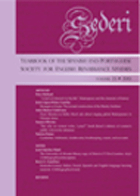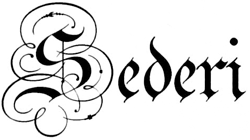
Sederi 23
Sederi 23 — 2013
EDITORS
Berta Cano Echevarría & Ana Sáez-Hidalgo
REVIEW EDITOR
Francisco J. Borge López
ISSN 1135-7789
Peter Holland, “’A Kind of Character in thy Life’: Shakespeare and the Character of History.” SEDERI 23 (2013): 7-31.
DOI: https://doi.org/10.34136/sederi.2013.1 Download PDF
Abstract
This article explores the early modern concept of “character” – and Shakespeare’s use of the word – as a way to rethink the nature of Shakespearean biography. Through the material of evidence of Shakespeare’s character, his writing, I turn to the figuring of “history” in Shakespeare’s plays, the writing of letters (leaving traces of characters as writing), before finally imaging a different kind of Shakespeare biography.
Keywords: Biography; character; history; Richard Quiney; Henry IV Part 2.
References
Berger, Thomas L. 1997. “’Opening Titles Miscreate’: Some Observations on the Titling of Shakespeare’s Works.” Ed. D.C. Greetham. The Margins of the Text. Ann Arbor: The University of Michigan Press: 155-172.
Berger, Thomas L. et al. 1998. An Index of Characters in Early Modern English Drama: Printed Plays, 1500-1660. Revised edition. Cambridge: Cambridge University Press.
Broch, Mark and Paul Edmondson 2009. Shakespeare Found: A Life Portrait. Stratford-upon-Avon: Shakespeare Birthplace Trust.
Chambers, Sir E.K. 1930. William Shakespeare: A Study of Facts and Problems. 2 vols. Oxford: Clarendon Press.
Cockeram, Henry 1623. The English Dictionarie. London.
Dawson, Giles E. 1992. “A Seventh Signature for Shakespeare.” Shakespeare Quarterly 43: 72-79.
Duncan-Jones, Katherine 2001. Ungentle Shakespeare. London: Thomson Learning.
Eccles, Mark 1961. Shakespeare in Warwickshire. Madison, Wisconsin: University of Wisconsin Press.
Fripp, Edgar I. 1930. Shakespeare Studies. London: Oxford University Press.
Goldberg, Jonathan 2003. “Shakespearean Characters: The Generation of Silvia.” Shakespeare’s Hand. Minneapolis: University of Minnesota Press: 10-47.
Greer, Germaine 2007. Shakespeare’s Wife. London: Bloomsbury Publishing.
Hall, Joseph 1608. Characters of Vertues and Vices. London.
Holderness, Graham 2011. Nine Lives of William Shakespeare. London: Continuum.
Holland, Peter 1989. “The Resources of Characterization in Othello.” Ed. Stanley Wells. Shakespeare Survey 41: Shakespearian Stages and Staging. Cambridge: Cambridge University Press: 119-132.
Jones, P.E. 1981. The Worshipful Company of Poulters of the City of London, 3rd edn. Oxford: The Poulters’ Company.
LEME: Lexicons of Early Modern English <url: leme.library.utoronto.ca>. Last accessed 16/07/2013.
Lieblein, Leanore 2009. “Embodied Subjectivity and the Creation of Early Modern Character.” Eds. Paul Yachnin and Jessica Slights. Shakespeare and Character. Basingstoke: Palgrave Macmillan: 117-135.
Mahood, Molly 1992. Bit Parts in Shakespeare Plays. Cambridge: Cambridge University Press.
Montreux, V.V 2008. “32 Short Thoughts about ‘The Glorious Moment’.” Shakespeare Bulletin 26/4: 65-75.
OED: The Oxford English Dictionary <url: www.oed.com>. Last accessed 16/07/2013.
Overbury, Sir Thomas 1614. A Wife Now the Widow. London.
Paylor, W.J. 1936. The Overburian Characters. Oxford: Basil Blackwell.
Rowe, Nicholas 1709. “Some Account of the Life, &c. of Mr. William Shakespear.” Ed. Nicholas Rowe. Shakespeare’s Works. Vol.1. London.
Schoenbaum, S. 1975. William Shakespeare: A Documentary Life. Oxford: Clarendon Press.
Schoenbaum, S. 1981. William Shakespeare; Records and Images. London: Oxford University Press.
Shakespeare, William 1986. The Complete Works. Ed. Stanley Wells et al. Oxford: Clarendon Press.
Shapiro, James 2010. Contested Will. New York: Simon and Shuster.
Stewart, Alan 2008. Shakespeare’s Letters. Oxford: Oxford University Press.
Thomas, Thomas 1587. Dictionarium Linguae Latinae et Anglicanae. London.
Yachnin, Paul, and Jessica Slights eds. Shakespeare and Character. Basingstoke: Palgrave Macmillan.
